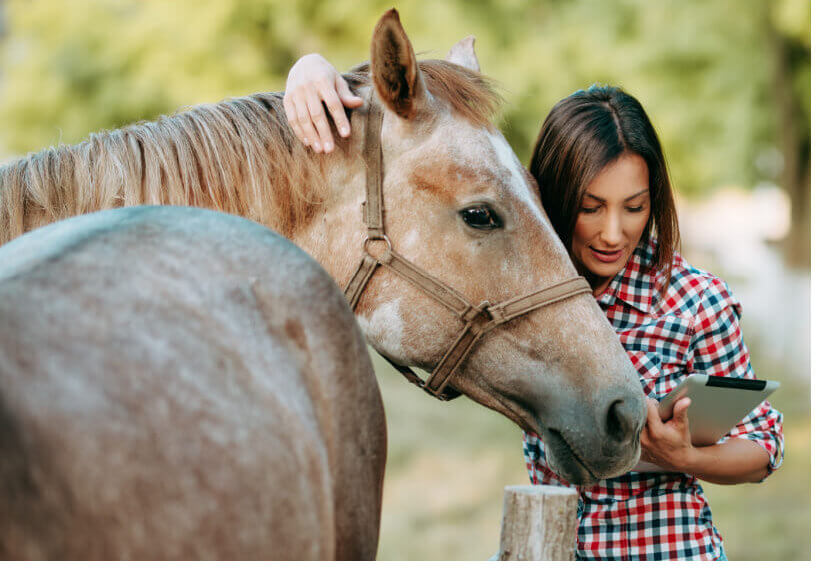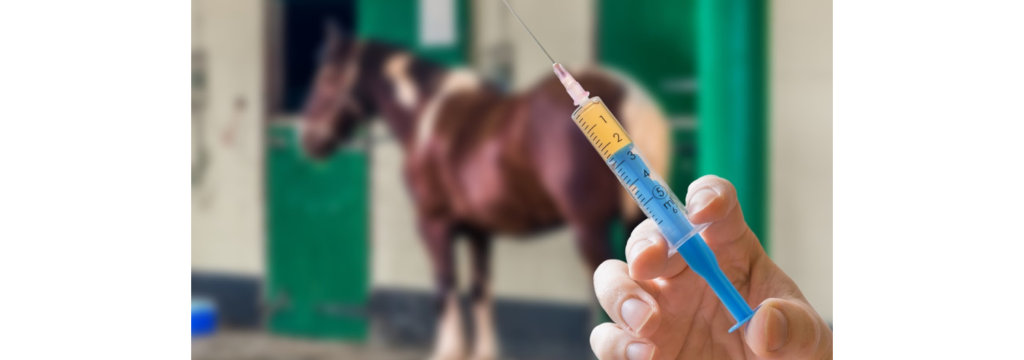
New horse owners need to be aware of horse diseases, the symptoms, and what to do when discovered.
I am not a veterinarian, so I highly recommend finding a qualified veterinarian to discuss with them about the diseases that your horse may be susceptible to. The veterinarian will provide you with a list of vaccines for horse diseases that your horse should receive and those that it should not. They are the only ones who can give you the right advice about your horse’s health. Before any vaccines are administered, you should have a discussion with your veterinarian regarding some of the crucial topics that need to be addressed.
If you’re a new horse owner, you have a great responsibility towards your animal.
Your horse is not only your companion but also your best friend, and it relies on you for its healthcare.
Therefore, as a responsible owner, you need to be aware of your horse’s behavior and demeanor, and you should observe it closely. Whenever you notice any changes in its behavior or health, you should call your vet immediately. Some diseases and conditions have similar symptoms, so it’s crucial to seek professional help in case of any doubt. Remember that being observant is the key to being a good horse owner.
Infectious diseases can be both costly and fatal to horses.
If your horse is displaying unusual symptoms, it is best to consult with your veterinarian to determine what course of action should be taken. Your vet will be able to diagnose whether your horse is suffering from a disease or a treatable condition. Many veterinarians will accept a picture of the issue you are seeing to help determine the next step. However, before owning a horse, it is essential to educate oneself on the minor and major health-related symptoms.
Prepare your finances for the extra expenses for proper horse health
By setting up a veterinary horse maintenance chart, you will be keeping your horse healthy and happy. You can prepare your finances for veterinary care/maintenance vital to being a responsible horse owner. Losing your horse because you didn’t want to vaccinate is inexcusable and not good horsemanship. Some horse owners can now take out health insurance plans that help pay for emergencies and death. Emergencies can add up to thousands of dollars. Routine Maintenance can add up quickly. Check with your local Equine Veterinarian about the costs of their routine care.
A veterinarian, a health maintenance schedule, and owner knowledge is vital to horse health care.

Equines are totally different than any other farm animal
Below is a quote by the American Association of Equine Professionals. A new owner should follow their guidelines. A veterinarian will put your new horse on a health maintenance schedule for its vaccines and supplements if needed. Always ask your vet and do not depend on the farmer next door who has cows to help you. . Below is a quote from the American Association of Equine Practitioners on vaccinating your horse.
A starting point in developing a vaccination program for your horses is first to determine the risk of infection for your animals with your local vet, who will know the diseases and risk factors common to your area. Are your horses farm-bound, or are they out at a new show every weekend? The process of shipping stresses horses in and of itself. So, that are shipped horses are also exposed to many other animals that might be carrying disease, they might need a more aggressive vaccination program to give them the best protection possible in these increased risk circumstances.
https://aaep.org/horse-owners/owner-guidelines/owner-vaccination-guidelines
Below is just a few Equine Diseases that a horse owner should know about
Eastern and Western Equine Encephalomyelitis
Eastern equine encephalomyelitis is caused by the Eastern equine encephalitis virus, for which wild birds are a natural reservoir. Mosquitoes that feed on EEE-infected birds can transmit the virus to humans, horses, and other birds. Horses do not develop high enough levels of these viruses in their blood to be contagious to other animals or humans. Because of the high mortality rate in horses and humans, EEE is regarded as one of the most serious mosquito-borne diseases in the United States.
https://thehorse.com/192250/north-carolina-mare-confirmed-with-eee-and-or-wnv/
Source: Michigan Department of Agriculture and Rural DevelopmentNumber Confirmed: 1;
https://www.equinediseasecc.org/alerts
Age: 18; Gender: Mare; Breed: Quarter Horse (QH); Onset of Clinical Signs: 8/31/2020;
Clinical Signs: Fever, lethargy, neurologic, Progressing to Being Down with an Inability to Get Up; Confirmation Date: 9/9/2020; Horse Status: Euthanized; Vaccination Status: Undervaccinated;
Notes: This is the 19th reported case of EEE in equids in Michigan for 2020 and the first reported case of EEE for 2020 for Jackson County.
Equine infectious anemia
EIA OR Equine infectious anemia is a viral disease. Insects transmit the virus-like horse flies through body fluids from infected horses—another fundamental reason to get yearly exams that include a Coggins test. EIA does not have a vaccine and no cure. This disease can go undetected. Once infected, a horse must be euthanized.
Source: Canadian Animal Health Surveillance System Number Confirmed: 1;
https://www.equinediseasecc.org/alerts
Number Exposed: Not Reported;
Clinical Signs: No clinical signs;
Notes: On June 18, 2020, a positive EIA result was confirmed by the CFIA’s national reference laboratory for a horse located on a premises in the rural municipality of Pleasant Valley, in the province of Saskatchewan. The horse had been sampled by an accredited veterinarian at the owner’s request after purchasing it. No clinical signs of disease were noted at the time of sampling. A CFIA investigation is underway and as per program policy, movement controls have been placed on the infected horse and its on-premises contact animals. Initial reports indicate there were other horses on the affected premises. Movement controls will remain until all disease response activities have been completed, including follow-up testing and ordering the destruction of positive cases. Trace-out activities may require the CFIA to undertake actions at additional premises as outlined in the current policy.
West Nile Virus
On Aug. 12, California Department of Food and Agriculture (CDFA) officials confirmed the state’s third case of West Nile virus (WNV) for 2020. The affected horse, an unvaccinated 17-year-old gelding from Merced County, experienced onset of clinical signs on Aug. 7. Signs included fever, depression, ataxia (loss of control of bodily movements), and dragging his hind feet. The horse is deceased.
Other horses confirmed with WNV this year were from Amador and Stanislaus counties. Two were unvaccinated and one had a vaccination history that was unknown. The other two horses are still living.
WNV transmission occurs when infected mosquitoes feed on animals, as well as humans, after having fed on infected birds.
West Nile virus has no cure; however, some horses can recover with supportive care. Equine mortality rates can reach 30-40%. The American Association of Equine Practitioners includes WNV as one of the core diseases all horses should be vaccinated against at least annually.
https://thehorse.com/191633/california-confirms-third-west-nile-virus-case/#:~:text=On%20Aug.,of%20clinical%20signs%20on%20Aug.
Source: Florida Department of Agriculture and Consumer ServicesNumber Confirmed: 1;
https://www.equinediseasecc.org/alerts
Age: 9; Gender: Gelding; Breed: Thoroughbred (TB); Onset of Clinical Signs: 8/4/2020;
Clinical Signs: Afebrile, Ataxia, Depressed Nature; Confirmation Date: 8/26/2020; Horse Status: Recovering; Vaccination Status: Undervaccinated;
Notes: This is the 7th confirmed WNV case for Florida in 2020.
Vesicular Stomatitis
Viruses can cause blisters and sores in the mouth and on the tongue, muzzle, teats, or hooves of horses, cattle, swine, sheep, goats, llamas, and a number of other animals. Lesions usually heal in two or three weeks.
Because of the virus’ contagious nature and its resemblance to other diseases such as foot-and-mouth disease, animal health officials urge livestock owners and caretakers to need to report these symptoms to their veterinarian immediately. Most animals recover with supportive care by a veterinarian.
https://thehorse.com/192050/seven-vsv-infected-premises-released-from-quarantine-in-missouri/
Researchers investigated how you can best protect your horses from contracting the vesicular stomatitis virus. Here’s what they found.
https://thehorse.com/190349/protect-your-horse-from-vesicular-stomatitis/
You can see how horse health care is so important to know before owning a horse.
New horse owners must educate themselves in horse health before taking the plunge into horse ownership.
Strangles

Strangles is highly contagious. And is a Bacterial infection transmitted by direct contact and coming into contact with contaminated surfaces Infected horses can spread the virus by sharing water buckets, grain buckets, and bits.
Clinical signs
Some horses who have been exposed or infected that show no clinical signs must also be placed into strict quarantine with biosecurity protocols.
Incubation Period
This disease may show no immediate symptoms because of the incubation period. It is during this time the horse can be infecting other horses. It may take 6 weeks after a horse has recovered from the clinical signs of strangles. Some horses become long-term carriers and cause outbreaks when introduced to new herds.
Factsheet for Strangles
I have given information from the Equine Disease Communication Center Factsheet for Strangles. Some measures can prevent breakouts and the spreading of this disease. This is one disease why the quarantining of new horses is vital at new facilities.
Clinical signs and symptoms:
https://aaep.org/sites/default/files/Documents/Outside%20Linked%20Documents/DiseaseFactsheet-Strep_equi_final%20Cobranded_0.pdf
• Fever, usually preceding other clinical signs by 24-48 hours
• Abscesses in the mandibular lymph nodes (in the throatlatch and below the jaw)
• Nasal discharge: often thick white and yellow mucus
• Inflammation of the throat
• Difficulty swallowing
• Wheezing
• Cough
• Purpura hemorrhagic- bleeding from the capillaries which causes red spots on the mucous membranes and swelling of the limbs and head (rare; only in cases with complications)
• Swelling of the muscles (rare: only in cases with complications)
Biosecurity: Strep equi outbreaks can be hard to prevent because of the prevalence of subclinical carriers (clinically healthy horses who shed the bacteria for weeks or even years after recovery). Outbreaks are common, especially in facilities with high horse traffic where new horses are frequently moved between stables or herds. Whenever possible, new horses should be quarantined for up to three weeks when being introduced to a new facility.
High standards of hygiene should be maintained in facilities to decrease the chance of horses contacting contaminated surfaces. To prevent indirect infection during an outbreak, handlers should avoid coming in contact with susceptible animals after handling infected animals. Handlers should wear protective clothing, avoid using the same equipment on multiple animals, and disinfect hands and equipment when moving between animals
https://aaep.org/sites/default/files/Documents/Outside%20Linked%20Documents/DiseaseFactsheet-Strep_equi_final%20Cobranded_0.pdf
Source: Florida Department of Agriculture and Consumer Services Number Confirmed: 1;
https://www.equinediseasecc.org/alerts
Onset of Clinical Signs: 9/5/2020;
Clinical Signs: Nasal Discharge, Swollen Lymph Nodes; Confirmation Date: 9/11/2020; Horse Status: Affected And Alive; Vaccination Status: Not Reported;

At-risk and Core Vaccines
There are core vaccines and at-risk vaccines. You and your vet will decide which is best for your horse. It will depend on a lot of factors, including his job.
At Risk
Strangles is on an at-risk list for vaccination. It will depend on what you do with your horse, whether they need this vaccine. If you keep him on your property only and have no contact with other horses that travel, you may be fine, not giving some at-risk vaccines. But if you plan on trailering your horse to venues where other horses take part, you should consider with your veterinarian what risks involved.
Core Vaccines
The West Nile Virus is an example of core vaccines for horses. This disease is not contagious once contracted and can be contracted from insects like mosquitoes. But, not a risk most horse owners don’t want to take.
Thanks for reading my blog on horse disease and health care for new owners. We need to make sure that every new horse owner makes preparations, and consider prevention of horse disease before they buy a horse.
I hope this post will help you understand why knowing about horse diseases is so important. And why quarantining a new horse is vital to assure the health of surrounding horses.
Check out the AAEP vaccination guidelines for more information on a Vaccinations schedule for horses.
7 Things to consider on buying a horse for the first time
7 Steps to buying a horse for the first time
My 9 point checklist for bringing a new horse home
If you can, please answer the question below, in the comments. Your experience can help another person new to horses.
- Have you had experience buying a horse that ended up with a health condition? How did that affect you?
- Do you or know of someone that has had a horse infected with a communicable disease and need isolation?





